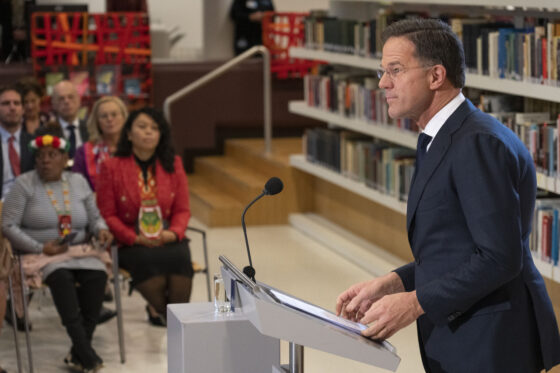Rutte apologises for slave trade: ‘Human dignity was trampled underfoot’


Prime minister Mark Rutte has formally apologised for the Netherlands’ slave trading past, in a speech that was criticised in advance for being arranged in haste and without consulting victims’ descendants.
Speaking at the national archives in The Hague, Rutte said he was apologising ‘for the actions of the Dutch state in the past’ during the 200 years in which more than 600,000 people were transported as slaves from Africa to the Dutch Caribbean colonies.
Rutte said he was making the apologies ‘posthumously to all those who were enslaved around the world and suffered by those actions, to their sons and daughters and all their descendants to this day.’
The speech was preceded by controversy over the government’s plans to apologise on December 19. Anti-slavery activists saying they wanted the apology to be issued on July 1 next year, the 150th anniversary of the abolition of slavery in Suriname, an event known as Keti Koti (‘break the chains’).
Last week a group of six organisations went to court to try to force the government to delay the announcement until July 1, arguing ministers had failed in their duty to protect citizens from harm, but a judge decided it was a political matter and declined to intervene.
Campaigners also criticised the cabinet’s plans to dispatch seven ministers to Suriname and the Dutch Caribbean islands to present the apologies, especially the choice of Franc Weerwind, the minister for legal protection whose family is from Suriname.
National memory
Rutte said the national archives was chosen as the venue for the speech because it was the site of the ‘nation’s memory’, where a ‘national examination of our conscience’ could take place.
‘For centuries the Dutch state and its representatives have facilitated, stimulated, sustained and profited from slavery,’ he said.
‘For centuries people were turned into commodities in the name of the Dutch state, exploited and mistreated. For centuries human dignity was trampled underfoot under the authority of the Dutch state, in the most appalling way.
And successive Dutch governments since 1863 have done too little to see and recognise the negative effects that our slave trading past had, and still has. For this I apologise on behalf of the Dutch government.’
Year of commemorations
Rutte repeated the apologies in English, the Surinamese language Sranan Tongo and Papiamento, a language spoken on the Dutch Caribbean islands.
Rutte also made clear that apologising for slavery was not an attempt to ‘clear the decks’, but to encourage a wider discussion of the slave trading past and its impact.
The government will draw up a programme of events throughout 2023 to mark the 150th anniversary of the abolition of slavery. Rutte also confirmed that king WIllem-Alexander will attend the official commemoration of Keti Koti in Amsterdam on July 1.
The speech coincided with the announcement of a €200 million fund to subsidise projects focusing on the history of the transatlantic slave trade. Descendants of those who were enslaved will also be able to change their names at no cost under a temporary regulation.
‘A comma, not a full stop’
‘We are doing this and we are doing it now, as we stand on the threshold of a significant year of commemoration, in order to find a way forward together,’ Rutte said.
‘We share not only the past, but the future. Today we are putting down a comma, not a full stop.’
It was unclear until the speech was delivered whether the prime minister would go as far as issuing an apology because of the heavy criticism in the build-up to the date. Deputy prime minister Sigrid Kaag flew to Paramaribo last Thursday to address complaints that the former colonies had had no input into the plans to apologise for slavery.
Rutte acknowledged that the preparations for the day ‘could have been better’, but went on: ‘Let’s not make that a reason to do nothing. We need to move forward together and try to make progress together.
He said he was recognising the ‘historic responsibility’ of the Dutch state for the slave trade, but added that there was ‘no one right moment for everyone’ to issue apologies.
Personal mistake
Rutte said the history of slavery had been the subject of increasing attention and ‘social awareness’ in recent years, prompting a shift in people’s thinking that he had personally experienced.
‘For a long time I thought it wasn’t possible to take responsibility in a meaningful way for something that happened so long ago and that none of us was personally involved in.
For a long time what I really thought was: our slave trading past is history that lies behind us. But I was wrong. Because centuries of repression and exploitation still have a legacy today in racist stereotypes, in discriminatory patterns of exclusion and in social inequality.’
Read the complete speech, in English
Reactions
Kathleen Ferrier, chairwoman of the Dutch Unesco Commission, told broadcaster NOS in a reaction that the apology was ‘a historic moment’.
‘I saw a prime minister who recognised the facts that mark the slavery history, who says he has learned and makes it clear there are so many dates, stories, facts that you can’t name one day. He is looking to the future. He also recognised the importance of spirituality. It really affected me. I saw people in the audeincewho were moved, but it was right that there was no applause.’
Jerry Afriyie, who founded Kick Out Zwarte Piet, said Rutte had ‘the right words…but we still need the right actions’.
Thank you for donating to DutchNews.nl.
We could not provide the Dutch News service, and keep it free of charge, without the generous support of our readers. Your donations allow us to report on issues you tell us matter, and provide you with a summary of the most important Dutch news each day.
Make a donation